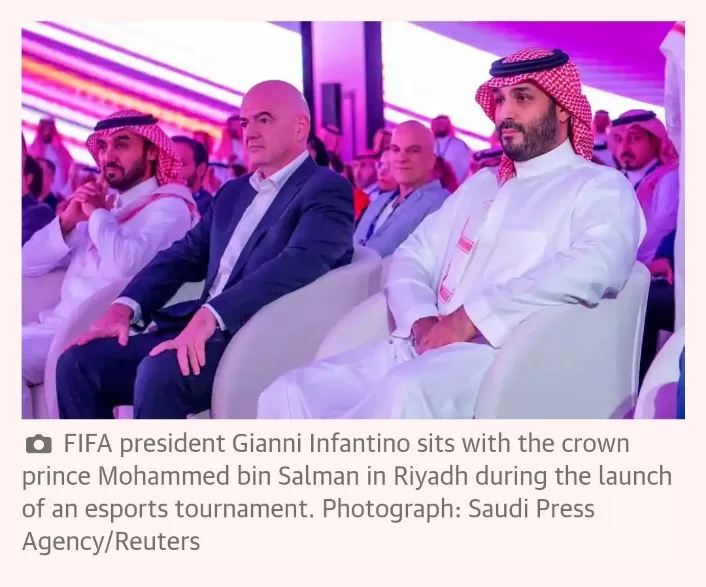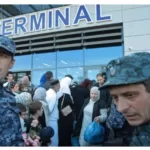In the wake of the 2022 FIFA World Cup in Qatar, the resounding question on everyone’s lips was when Saudi Arabia would have its turn to host this prestigious tournament. Like a rapidly advancing fog, the discussion gained widespread attention, and the outcome seemed inevitable. In less than a year, that anticipation has been answered.
Saudi Arabia has been awarded the privilege of hosting the FIFA men’s World Cup in 2034. Short of unforeseen and catastrophic circumstances, this decision is set in stone. While officially expressing only “interest” in hosting the 48-team event, Saudi Arabia stands as the sole contender. Notably, it enjoys the endorsement of the Asian Football Confederation and over 100 FIFA member nations. Moreover, it has captured the attention of Gianni Infantino, the FIFA president, who demonstrated his enthusiasm for sports in the nation during the recent launch of an esports tournament in Riyadh.
What took many by surprise was the manner in which Saudi Arabia clinched uncontested victory. A FIFA council meeting in early October, initially expected to discuss routine matters related to the international football calendar, introduced a game-changing topic: “Bidding processes and hosting of the FIFA World Cup™.” This entailed a complete overhaul of bid timing regulations implemented just a decade prior, guaranteeing the rotation of the tournament among all confederations. In this new framework, Asia or Oceania was assured the role of host for the 2034 World Cup. These changes provided Saudi Arabia with the confidence to bid and led to almost immediate confirmation of its success. The senior football administrators at the meeting, including the UEFA president and the chair of the English FA, were informed of these proposed alterations just a week in advance, yet they were smoothly approved.
Surprisingly, there has been no significant public discontent regarding the management of this process. Australia, long rumored to have ambitions for the 2034 men’s World Cup, opted to withdraw when presented with a 25-day expedited deadline to make a decision. Football Australia, which competes as part of the Asian confederation, accepted the process, with its chief executive, James Johnson, saying, “It is what it is.” Australia is now leading the contenders to host FIFA’s ambitious new Club World Cup in 2029
If recent events suggest that football has aligned itself with Saudi Arabia’s desires, it’s not the first time that discussions of values, including transparency and accountability, have fallen short in the face of football’s reality. Nonetheless, it underscores the realization of Gianni Infantino’s vision for football as a truly global sport.
The previous World Cup in Qatar saw a rejection of attempts to impose European values on the tournament, including bans on beer and the refusal to accept the rainbow flag as a symbol of LGBTQ+ solidarity. Now, the World Cup is returning to the Gulf and Saudi Arabia, where homosexuality is illegal and political dissent is met with severe consequences. This presents a challenge for European nations, particularly England, on how they approach the tournament and engage with these issues. European leagues are likely to face disruption with another winter World Cup. For nations elsewhere, many of which have signed agreements with the Saudi Football Federation that have benefited their resources and development, the outcome signals a shift in the balance of influence.
For FIFA and the broader football community, the prospect of substantial Saudi investment following the World Cup through sponsorship or more agreements is now a reality. The question on the minds of those who closely monitored developments last year in Doha is: What does Saudi Arabia aim to achieve with this venture? The answer remains uncertain. The country clearly has ambitious plans for sports, viewing it as a means to boost tourism and foster national unity. However, these grand plans are intertwined, each dominated by the aspirations of one man: Crown Prince Mohammed bin Salman.
In a recent statement, Prince Mohammed expressed his support for sportswashing, provided it could “increase my GDP by way of 1%.” Hosting a major sporting event may not be the simplest path to bolstering the national economy, and Saudi Arabia still has considerable infrastructure to construct, with just four out of the required 14 stadiums currently in place, even after FIFA reduced the minimum necessary for hosting. While the confirmation of the World Cup serves as a symbol of Saudi Arabia’s influence in the sporting world, its broader implications remain to be seen.




